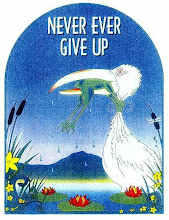
Tuesday, August 18, 2009
Sunday, August 16, 2009
Friday, August 14, 2009
Monday, August 10, 2009
On a Beautiful Day 35 years ago TODAY
Thursday, August 06, 2009
Tuesday, August 04, 2009
Monday, August 03, 2009
Friday, July 31, 2009
Sunday, July 19, 2009
Remember the camp song Five little Speckled Frogs?
Saturday, July 04, 2009
Saturday, June 27, 2009
Wednesday, June 10, 2009
Box turtles
Ann wants to tell you about ME - You can call me Carolina
Eastern Box Turtle
(Terrapene carolina) is one of two species of box turtles found in the United
States
I did not know this until early 2009.
Moving or relocating such turtles will only result in tragedy.
If you see a turtle that must be relocated you must first be SAFE!
Pull off the road in a SAFE PLACE.
BUT in the direction the turtle was heading.
BE CAREFUL of traffic…your life is more important.
Sometimes land that is being cleared for development will disrupt the turtle
habitat.
Move the turtle to the nearest woodlot or pasture.
Best bet is to work to reduce urban sprawl.
But remember!
Support the protection of wild areas and habitats where box turtles might
live.
Habitat loss and fragmentation are both severe threats to box turtle
populations.
As their habitat shrinks, the turtles will have a more difficult time finding food,
shelter, and mates.
By helping to protect their habitat, you are giving these turtles a place to live,
as well as helping other species that share the same habitat as the turtles.
Thursday, May 28, 2009
Here is my story about Turkeys and Flowers
Hi there it’s me ANN
With a true tale about Goldie and Slate
Bronze turkeys are the product of crossing domestic turkeys brought from Europe
by colonists (which had been exported to Europe years before) with the Wild
Turkey.
These matings produced a bird that was larger and more robust than the
European turkeys, and tamer than wild turkeys.
Though the Bronze turkey type was created in the 18th century, the actual name
was not used until the 1830s, when a strain developed in the U.S. state of Rhode
Island was named the Point Judith Bronze.
The name later spread to be used in reference to the breed as a whole, and was in
the process simplified to just "Bronze".[2]
In the British Isles, the Bronze was associated with Cambridge, and was called the
Cambridge Bronze, but again this name has been simplified to just "Bronze".
 Do you see SLATE?
Do you see SLATE?

 See Slate?
See Slate?
 Blue Clematis
Blue Clematis
known as the Spanish Black in the United States and the Norfolk Black in
England.
The Slate was accepted as a standard variety by the American Poultry Association
in 1874, incidentally the same year as the Spanish Black.
You may call me SLATE!
Saturday, May 23, 2009
A step back in time
Today A LUNCHEON AT Adaland Mansion


Modisett, Sheriff of Barbour County and local banker.
The brick house was constructed by local carpenters and emancipated slaves and
is an example of neo greek architecture.
The interior has been restored using 1870-1890 period wallpapers and furniture
from local sources which compliment the original walnut woodwork.
Guided historic tours are provided.
The house is open for parties, weddings, receptions, dinners, luncheons and
meetings.
Adaland Mansion is owned by the City of Philippi.
It was donated to the City of Philippi in January 1996 by Philippi Development
Inc., a division of Anker Energy.



hills of Barbour County, with wonderful views of the surrounding countryside.
Guided tours of the home reveal a carefully restored house with period
wallpapers, antique furniture and period gardens.
The 1850 barn on the property, a good example of early farm post and beam
architecture, now serves as a heritage center.




features homemade brick and walnut woodwork throughout.
The barn was built approximately 1850 and
has been restored and is open to the public on during tour season.
The house and land reflect the early history of West Virginia with the original
owners engaged in farming.
Emancipated slaves from the farm worked on the construction of the house.
The surrounding area is rich in civil war history with the first land battle of the
war fought in Philippi in June 1861.
Subscribe to:
Comments (Atom)






















































